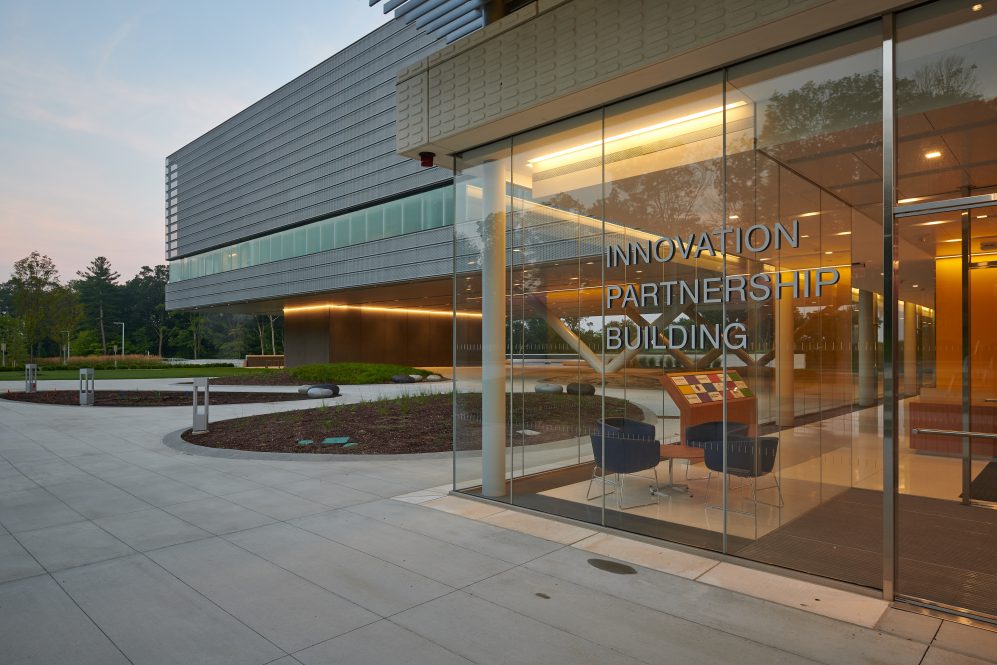The Digital Twins workshop, held mid-November on the UConn campus, will standardize approaches to DT development and deployment in manufacturing

A view of the Innovation Partnership Building. (Peter Morenus/UConn Photo)
UConn's Pratt & Whitney Institute for Advanced Systems Engineering, in partnership with the U.S. Department of Energy (DoE) and the National Science Foundation (NSF), will host a comprehensive workshop exploring the impact, importance, technological advances, and emerging trends involving Digital Twins (DTs) in manufacturing. The workshop to be held on November 12 – 13, 2024 at the Innovation Partnership Building at UConn Storrs will be open to the public and all stakeholders. The program will include in-person and virtual sessions.
DT technologies are enabled through the convergence of computing, control, communication, and networking. They utilize repeatable and reusable models, knowledge extraction and updates from a multitude of heterogeneous data sources, coupled with proactive decision-support systems. The scope of DT applications is broad, ranging from manufacturing, engineering, health care, urban planning, energy, transportation, and more.
The DT workshop, says George Bollas, associate dean of Research for the UConn College of Engineering (CoE), and director of the P&W Institute for Advanced Systems Engineering, will bring together leading experts from academia, community colleges, industry, government, and national labs to address the critical need for standardized approaches to the development and deployment of digital twins in manufacturing.

"As the manufacturing sector evolves into a more interconnected, automated, and intelligent ecosystem, DTs play a pivotal role by providing virtual representations of physical entities and processes that enable real-time data integration, predictive analytics, and proactive decision-making," Bollas explains. "Key objectives include establishing a clear and practical definition of DTs tailored for manufacturing, identifying core characteristics and capabilities, and developing best practices, standards, and protocols." Additionally, Bollas stresses, the workshop aims to create strategies for education and workforce-development to ensure a skilled workforce for DT implementation, and to foster collaborative platforms for knowledge exchange.
Sudarsan Rachuri – technology manager, Advanced Materials and Manufacturing Technologies Office, Office of Energy Efficiency & Renewable Energy, DoE – is representing the DoE in planning and implementation. What sets this workshop apart from other DT exercises, he says, is its emphasis on creating a unified framework for DTs that can be applied across various industries.
"The workshop will culminate in actionable outcomes, including the establishment of a DT repository, the creation of a strategic roadmap for future DT initiatives, and the formation of collaborative networks to drive innovation and implementation," Rachuri explains. "By convening a diverse group of stakeholders, we seek to accelerate the digital transformation of manufacturing enterprises, enable clean energy transition, enhance the global competitiveness of U.S. manufacturing, and lay the foundations for more sustainable, innovative, and efficient manufacturing practices."
The DT workshop will feature keynote speeches, panel discussions, technical presentations, breakout sessions, and networking opportunities, all designed to facilitate the exchange of knowledge and the development of a unified framework for DTs in manufacturing.
The expected outcomes, Bollas affirms, include a comprehensive workshop report with specific recommendations for industry and research priorities, the establishment of a DT repository for exemplar-use cases, and the development of a roadmap for future DT initiatives. UConn, the NSF and the CoE, he adds, are delighted to play a leading role in this field of study and are excited to be working together in planning and hosting the workshop.






